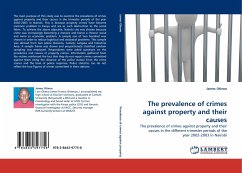There is a significant body of research on delinquency and associated risk factors conducted in Western societies. Similar research has been less common in other cultural contexts. A quantitative survey of a national sample of 1507 Estonian youths in mainstream school grades 5-9 examined the prevalence of delinquency and the relationship between delinquency and individual, family, peer and neighbourhood risk factors. Findings indicated that there were differences in the prevalence and types of offenses in terms of gender and school-level ethnic affiliation. In this study, male gender, age, attending Estonian-medium school, higher levels of hyperactivity, family type, lower levels of parental monitoring, higher levels of peer delinquency, neighbourhood disorganisation and exposure to violence were independently associated with delinquency outcomes. Deviant peers mediated the association between gender, parental monitoring, neighbourhood characteristics and delinquency. This book discusses relatively high prevalence of delinquency amongst Estonian youth, risk factors for delinquency, mediating effect of peer delinquency and study implications for research and policy.
Bitte wählen Sie Ihr Anliegen aus.
Rechnungen
Retourenschein anfordern
Bestellstatus
Storno








